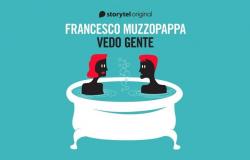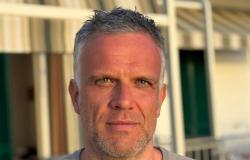Massimo Troisi was just 41 years old and still had a world to tell when his heart stopped beating on the night of June 4, 1994, in her sister Adriana’s house in Infernetto, near the Ostia beach. That his imprint on Neapolitan culture, on the very image of these people, on Italian cinema and theater is still vivid and current is confirmed by the worldwide success of the film-portrait of Mario Martone “Someone over there loves me“, applauded in its world premiere at the Berlin Film Festival and then awarded this year with the David di Donatello.
His whole life revolved around the theme of the “heart”, a physical object that marked his life due to a strong degeneration of the mitral valve caused by childhood rheumatic fevers, but also a symbol of his idea of life and artistic creation. In fact, few Neapolitans had dared – before him – to expose this instinctive romanticism that Troisi was able to filter through personal and cultured poetics. For this reason, his art must be brought closer to the secret melancholy of Totò or the contrast between physical arrogance and secret shyness of Buster Keaton rather than the lesson of Eduardo De Filippo.
Instinctive mime, fluvial storyteller, passionate lover of a people’s language that is not simply a Neapolitan dialect, Massimo Troisi gave a decisive turning point to the scene of the 70s and 80s, from his cabaret appearances with the friends of “The Grimace” (Enzo Decaro and Lello Arena) on TV, up to his cinema made up of seven directions, from “I’ll start again from three“(1981) to “The postman” (1994) officially signed by Michael Radford, and as many collaborations as actor-author among which the memorable “We just have to cry” with Roberto Benigni in 1984.
The first “star” in Troisi’s sky was Pier Paolo Pasolini, a much-loved poet in whose name he won a youth poetry prize and who he imitated with gusto in some early sketches. Then came Antonio Petito, whose vernacular streak led him to revisit the commedia dell’arte and the Neapolitan tradition. But looking at Pulcinella, already in the ’70s he said: “To me this figure seemed really tired. I thought it was necessary to be Neapolitan, but without a mask, to maintain the strength of Pulcinella: the embarrassment, the shyness, the never knowing from what brings in and his candid phrases”. Thus his first one-act plays as an author lower the comic masks into a present full of references to the struggles of the common people of modern Naples.
Since his appearances in the theater at the Sancarluccio and then in the cellars of the Roman avant-garde it was clear that Massimo’s expressive inspiration went beyond the provincial dimension and, like all Neapolitan art of that period, spoke to the world with an increasingly “worked” language “and universal. To bring it on TV together with the friends of “The grimace“it was Enzo Trapani and Giancarlo Magalli for the variety show”No Stop“. But in that new world it was Bruno Voglino, an inexhaustible pygmalion of talents, who acted as his guide. After four years of success Troisi freed himself from group work (while always remaining a friend and companion of Lello Arena) to make his film debut with “I’ll start again from three“, thanks to the intuition of producer Mauro Berardi and the screenplay work with Ottavio Jemma and his future partner Anna Pavignano.
It was an epochal success, capable in itself of relaunching Italian cinema and brought the author two David di Donatello, three Silver Ribbons, two Golden Globes. But starting from the next “Sorry for the delay” of 1983 it became clear that if on the one hand the author-actor did not bend to the laws of the market (he didn’t strike while the iron was hot), on the other hand his heart was at the center of his poetic research. In fact the film revolves around the doubts of the individual and the different times of love, themes that he would constantly revisit from “The ways of the Lord are finished” to “I thought it was love… instead it was a buggy.”
The actor Troisi finds himself at this point in his career – thanks to the resounding success of “We just have to cry – a fundamental human and artistic partnership with Marcello Mastroianni (apparently very different from him) and Ettore Scola who called him three times with him from “Splendor” to “What time is it?” to the very autobiographical “Journey of Captain Fracassa“, in which he took up the mask of Pulcinella with a dazzling mixture of vitality and melancholy. As for “The Postman” written with Furio Scarpelli following the novel by Antonio Skarmeta and entrusted with the direction of his friend Michael Radford, much has now been said .
From the strenuous desire to finish filming despite the worsening of his heart condition (he would have had to undergo a fatally postponed transplant), up to the total identification with the two characters of the story (the poet was played by Philippe Noiret), everything in this story between Salina and Procida talks about Massimo. Five Oscar nominations (rare case of posthumous nomination for him) and an ovation at the 1994 Venice Film Festival remain to seal his value and emotion. “I want to make this film with my heart”, he said on the set and for him, as for his friend Pino Daniele, it was his heart that accompanied him to the last step.
Thinking about it today, the title of a small French film from the 90s comes to mind: “The Fracture of the Myocardium” in which little Martin faces the reality of death with the playful lucidity of childhood. Massimo Troisi was like this: a child in an adult’s body who knew how to read himself and the world with that clarity that only fairy tales can tell. And his life remains for us a sad fairy tale illuminated, in the end, by the awareness that when art is dedicated to telling the intermittences of the heart it speaks to the soul of each one and forever.
Reproduction reserved © Copyright ANSA






